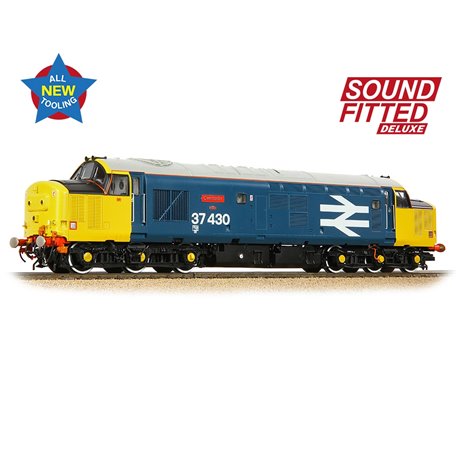No products
Product successfully added to your shopping cart
There are 0 items in your cart. There is 1 item in your cart.
Open on Good Friday
The shop will be open on Friday 18th April.
Bring us some chocolate!
Class 37/4 Refurbished 37430 'Cwmbran' BR Blue (Large Logo)
35-335fx
Bachmann
Class 37/4 Refurbished 37430 'Cwmbran' BR Blue (Large Logo)
This product is out of stock
More info
Class 37/4 Refurbished 37430 'Cwmbran' BR Blue (Large Logo)
The British Rail Class 37 is a favourite among enthusiasts and modellers alike, and this iconic loco returns to the Bachmann Branchline range for 2022, but not as you know it. Following in the footsteps of the award-winning Bachmann Branchline Class 47, our all-new OO scale Class 37 has been designed from the rails up to ensure this classic locomotive is modelled more accurately than ever before, whilst the technical specification is equally impressive and incorporates the same great features as our Class 47. With high fidelity mouldings, numerous separately fitted parts and countless tooling variations to capture the minutiae of the real locomotives throughout their lives, our new 37 is brought to life with an exquisite livery application using true-to-prototype colours, fonts and logos. Along with an unprecedented array of lighting features, our Dual Fitted speaker system brings this SOUND FITTED DELUXE model to life and what’s more, it also features our award-winning motorised radiator fan and authentic tinted windscreen glazing!
- Bachmann Branchline OO Scale
- Era 8
- Pristine BR Large Logo Blue livery
- Named ‘Cwmbran’
- Running No. 37430
- Etched Nameplates included
- SOUND FITTED DELUXE - Fitted with a Zimo MS450P22 DDC Sound Decoder – See below for the function list
- Motorised Radiator Fan
- Tinted Windscreen Glazing
- Length 245mm
DETAIL VARIATIONS SPECIFIC TO THIS MODEL
- Central Headcode Panels – Plated and fitted with Sealed Beam Marker Lights
- Top Centre Lamp Bracket
- High Intensity Headlight
- Bufferbeam Valance Removed
- Coupling Bash Plate
- Oval Buffers
- Original Windscreen
- English Electric Cantrail Grilles
- Welded Boiler Roof
- Plated Boiler Port and Safety Valves
- Sealed Water Filler Door and Plated Access Steps
- Fabricated Bogies
- Original Speedo Drive
- Slow Speed Control
- Mileage Counter
- Twin Fuel Tanks with one Gauge per Tank (left hand tank each side)
BACHMANN BRANCHLINE CLASS 37 SPECIFICATION
MECHANISM:
- Five pole, twin shaft motor with two flywheels providing drive to both bogies
- All axle drive
- Electrical pickup from all wheels
- Separate metal bearings fitted to each axle
- Diecast metal chassis block and bogie towers
- Diecast metal gearboxes, with gearing arranged for prototypical running speeds and haulage capabilities
- 5mm (OO gauge) wheels to NEM310 & NEM311 standards with authentic profile and detailing
- Detachable coupling pockets to NEM362 standards fitted to each bogie
- Designed to operate on curves of second radius (438mm) or greater
DETAILING:
- Bogies constructed from multiple components featuring full relief detail
- Rotating radiator fan, driven by an independent motor and gearbox, operated as part of the sound project on DCC and Analogue control (SOUND FITTED DELUXE models only)
- Tinted windscreen glazing (SOUND FITTED DELUXE models only)
- Separately applied metal detail parts, including grab handles, windscreen wipers and etched fan grilles
- Sprung metal buffers
- Each model supplied with a full set of decorated, model-specific bufferbeam pipework and accessory parts
LIGHTING:
- Directional lighting, including headlights and high intensity headlights where applicable, switchable on/off at either end on DCC or Analogue control
- Cab lighting*, assigned to two DCC functions for separate switching of each
- Separately switched Engine Room lighting*
- ‘Yard Light’ mode*, red tail lights and/or marker lights displayed at both ends (*when used on DCC)
- Authentic light colours and temperatures selected for each model based on era and application
DCC:
- Plux22 DCC decoder interface
SOUND:
- Two quality speakers employed for optimum sound reproduction, fitted to every model as standard
- Zimo MS450P22 DCC Sound Decoder fitted to SOUND FITTED and SOUND FITTED DELUXE versions
- Four sound projects to accurately capture the sounds of Class 37/0s as originally built, those with thermostatically controlled fans, Class 37/4s and DRS-modified locos.
- Sound files for each project produced specifically for the Bachmann Branchline Class 37 using recordings from real locomotives
- SOUND FITTED and SOUND FITTED DELUXE models operate on DCC and Analogue control as supplied. On Analogue, an authentic engine start up sequence and running sounds are produced when power is applied
LIVERY APPLICATION:
- Authentic liveries applied to all models
- Multiple paint applications employed on each model using BR and corporate specification colours
- Logos, numerals and text added as appropriate using multi-stage tampo printing using authentic typefaces, logos and colours
- In addition, where applicable Etched Nameplates and Plaques are also provided
SOUNDS
F0 - Directional Lights - On / Off (plus Light Switch Sound)
F1 - On - Warm Engine Start / On, Off - Failed Engine Start / On, Off, On, Off, On - Cold Engine Start
F2 - Brake
F3 - Single Horn (Playable)
F4 - Double Horn
F5 - Light Engine Mode
F6 - Coasting (Manual notch Down if F22 On)
F7 - Speed Lock
F8 - On - Sound Fade Out / Off - Sound Fade In
F9 - Flange Squeal (Speed Related)
F10* - Fan Operation & Noise
F11 - Buffer Up
F12 - Coupling
F13 - Stationary - Guard’s Whistle / Moving - Detonators
F14 - Wagon Snatching & Buffering (Speed Related)
F15 - High Intensity Light (If Fitted)
F16 - Red Tail Lights On Both Ends (Non Directional)
F17 - Marker Lights On Both Ends (Non Directional)
F18 - Cab Light On - No. 1 End (Fan)
F19 - Cab Light On - No. 2 End (non-Fan)
F20 - No. 1 End Directional Lights Off
F21 - No. 2 End Directional Lights Off
F22 - Compressor
F23 - Windscreen Wipers
F24 - Engine Room Lights
F25 - Spirax Valve
F26 - Shunt Mode
F27 - Volume Down
F28 - Volume Up
* Fan Operation and Sounds are activated as part of the Sound Project with F1 On. F10 allows you to override this and activate on demand (not applicable to Sound Project 1 - Class 37/0s as-built)
Analogue Users: Please note that normal load running sounds and any other automatic or randomised sounds will also operate, along with fan operation and sounds (according to the particular Sound Project) when this model is used on analogue control (DC) straight from the box!
CLASS 37 HISTORY
The British Rail 1955 Modernisation Plan paved the way for the large-scale replacement of steam traction with diesel locomotives, and one of the most successful diesel locomotive designs to result from this was the English Electric Type 3. These 1,700hp Types 3 diesel-electric locomotives were built at English Electric’s Vulcan Foundry and by Robert Stephenson & Hawthorns between 1960 and 1965, with 309 examples produced in total. When TOPS was implemented the type was designated Class 37.
The class proved popular with railwaymen and so in 1985, a major refurbishment programme for the Class 37 locomotives was sanctioned to extend the working lives of 135 locomotives. Features of the refurbishment involved plating over the four-character head codes and sealing off the nose end communication doors. Dedicated freight locomotives received lower gearing to increase the tractive effort, and some were fitted with extra ballast or even more powerful engines. A new subclass was created for locomotives refurbished with Electric Train Heating (ETH) equipment, allowing their use on passenger trains the whole year-round.
With the sectorisation of British Rail taking hold in the early-1980s, the locomotives returned to traffic following refurbishment in a wide and diverse range of liveries. Passenger machines appeared in BR Blue Large Logo, InterCity and Regional Railways schemes to name just three, whilst freight engines received numerous varieties of Railfreight livery, Transrail, Mainline and Loadhaul. The Class continued to be widely used into the Privatisation-era, with examples operating for the likes of EWS, DRS, West Coast Railways and Colas, whilst others have received ‘retro’ heritage repaints.







